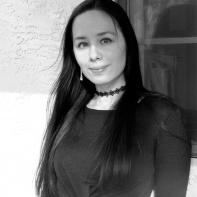Dara Elerath

Dara Elerath received her MFA in poetry from the Institute of American Indian Arts. Her poems have appeared in journals such as The American Poetry Review, AGNI and Poet Lore, among others. She was the winner of the Francis Ponge Poetry Prize. She lives, writes and designs in Albuquerque, New Mexico.
{ }
His two dark arms, wiry as cricket limbs, reach to embrace you. He lives to swallow space, yet is never filled. At times you dream he is a gong struck by long-robed nuns, ringing out his single note of no. Hours you’ve devoted to his study. Without knowing, you have sought him in the notches between your ribs, in the pale rings left by a half-spilled glass of milk. He is the hilt on the sliver blade of zero; he cuts nothing, yet kills anything that enters him. Empty set is what they call him, though Annihilator is a better word—he is thoughtless: a black fox hunting in snow; or rotten: a hole in the mouth where the tooth has gone missing. At night he lies beside you, a hollow in your pillow filled with smoke. If you shake a die without pips, his number comes up every time; he is a pair of hips you try to hold; he is a harness which, like a dog, you are caught in, going nowhere, chained to a stake in the ground. The sound of his voice is the sound of wind lifting past you, as you choke, as you whimper.
Oriflamme
It was what we wore when we were cold. Where is your oriflamme? my mother would ask as she watched white flakes flicker across the frost-crusted prairie. Or it was a dish of pickled grapes we served with lemon, our lips slippery as we licked the tin forks we ate it with. Though perhaps oriflamme described the time two lovers twined together in soft embraces. It was their oriflamme an aunt might offer, knowingly. Nine months later a child would be born whom they’d name Tor, the god of thunder to some, though instead of a hammer, he held an oriflamme, this being an ax with an iron blade, a cherry wood handle and a small black thong wrapped around the haft. An oriflamme granted to a family meant prosperity, yet a broken oriflamme meant a hundred years bad luck. Though it’s possible oriflamme was only a pet name: kiss me, my oriflamme, one would say, and you could hear in the word the soft m of mother’s milk, the silk of the o like a golden bead strung on a necklace, or cooing noises made by a child; so the word oriflamme was a word for tenderness. Oriflamme dripped from the lips of a husband and descended on his wife’s ear like a kiss or was uttered by a girl gazing up at the moon, the o a reflection of that moon in a moss-woven pond, doubling, trebling so the word grew smoother, longer: ooriflamme or oooriflamme, her breath misting the window with the history of our people, the Oriflamme people, who, in the luminous evening shadows trapped wild oriflamme; the silver fur of our coats the fur of the oriflamme-goat. In the cold night we huddled together, casting stones to match the stars, the Oriflamme maps that foretold your birth, the birth of the first Oriflamme prince, that we would rinse your body in the dark waters of the Oriflamme, that we would place you in a small oriflamme, or cloth cradle, that we would ladle the blood of an oriflamme over your mouth, that we would count the days and watch you grow, your long, black braid glistening with the sap of the oriflamme tree we used to condition it with. It was a word you woke singing: oriflamme, pronouncing it with perfect diction, the lilt of your tongue making a ladder up to heaven, which, one day we would all ascend, rung by rung, on the backs of the two m’s saying the word over and over as it drifted across the blackness of the night:
oriflamme,
oriflamme,
oriflamme,
oriflamme,
oriflamme—
THE BLACKBERRIES
Between the night-lustered blackberry shrubs, I could see the girls crying. They caught their tears in copper bowls and poured them over the soil. Soon, the branches grew heavy and they reached to gather the fat, unusually swollen fruit. Hands and wrists stained by juice, they laughed like nervous butchers; yet, what were they butchering? What were they eating but sweetness? Their lips bore the color of goat’s blood and rubies, the tint of old wounds and bruises. Their laughter echoed until all of the berries were gone. Then they grew sad again. I watched as this happened each year. Sometimes, that was all I did—watch them. I longed for their strange beauty. When their tears refilled the bowls, thoughts of the black juice haunted me. Even in winter, as frost glazed the orchard, I could still see them. I sought the hue of that dark fruit everywhere.

